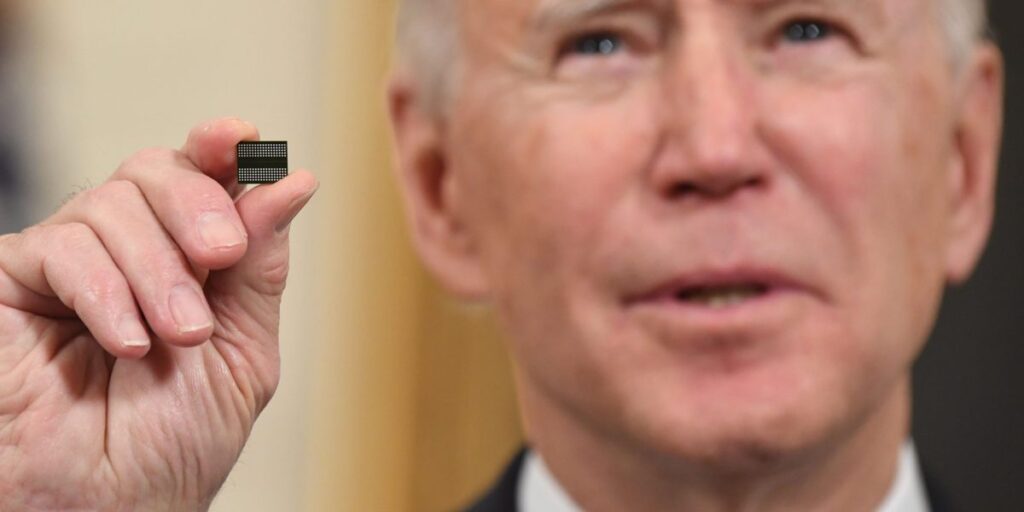
It takes up to 500 highly specialized chemicals for the production of one semiconductor chip. Some of these will soon be subject to flawed new environmental regulations that will skyrocket costs and effectively ban production of these chemicals for US manufacturers. This will stop domestic production and give our foreign competitors an advantage in the global market.
For his own sake and the sake of the country, President Joe Biden would be wise to change course. This regressive approach to regulation will work against its environmental and economic goals, forcing manufacturers to outsource production to other countries with lax environmental standards and raising prices for the everyday products we need to thrive.
Almost all household and commercial products—from computer chips and medicines to the materials that make up your home to the energy that powers your life—begin with chemical production. Innovation in this sector over the past century has created new industries, helping our country become a dominant force in the world. But we are now approaching a dangerous inflection point, with sweeping new restrictions threatening to overwhelm what is already one of the world’s most heavily regulated industries.
After decades of success and an 80% reduction in chemical incidents, the Environmental Protection Agency (EPA) recently introduced new rules for chemical plants, burdening companies with impossible mandates that will impact our nation’s ability to supply safe food, clean water and reliable energy. The rule restores and expands restrictions put in place by the Obama administration a decade ago, which the Trump administration rescinded due to serious economic and national security risks. The scope and cost of these mandates for chemical companies is enormous. They have more than tripled from the EPA’s original proposal in 2022 and will pose significant compliance challenges for many businesses.
Impeding America’s ability to produce these chemicals at home does not eliminate the need for them. This only pushes companies to purchase from countries that do not share our commitment to environmental and health standards, and forces American companies to move production overseas. This severely inhibits innovation by diverting capital that could be spent on research and development to creating new supply chains overseas and importing finished products.
Warning signs of this chilling effect on innovation are evident in recent research. survey chemical companies. Two-thirds said the current regulatory framework jeopardizes their efforts to achieve clean energy goals, for example by suppressing the production of lithium-ion batteries for electric vehicles and grids. About half were discouraged from investing in the medical equipment needed to diagnose and treat diseases and keep hospitals sterile and safe. And most companies regretted the impact on the domestic market. semiconductor production– pressing national security issue.
China is already the world’s leading producer and exporter of chemicals, and many of the regulations proposed by federal agencies appear designed to preserve that situation. They threaten more than a million jobs And $110 million in the wages of hardworking Americans.
Before imposing additional regulations, President Biden should consider creating an Interagency Policy Committee, led by the director of the White House National Economic Council, to coordinate economic impact analysis. He should require all Cabinet departments to evaluate the impact of these regulatory proposals on American jobs, domestic manufacturing, and especially the Infrastructure Investment and Jobs Act, the Inflation Relief Act, and the CHIPS and Science Act.
The Committee should also consult with industry leaders who bear the brunt of this regulatory burden. There is already a precedent for such a step on the part of presidents of both parties. The Obama administration worked with industry groups to achieve some of its climate goals. And early in his term, former President Trump established Strategic and Political Forum they included some of the most prominent business leaders, including Blackstone’s Stephen Schwarzman, Disney’s Bob Iger and JP Morgan’s Jamie Dimon.
President Biden could do the same. A rigorous, balanced analysis of the costs and benefits of new environmental regulations will help him avoid raising the cost of living for our already struggling families and sending high-paying American jobs overseas. As one of the most important elections in a generation approaches, he cannot afford to make unforced errors.
Chris Yang is president and CEO of the American Chemistry Council.
Another must-read comment posted by Luck:
The views expressed in Fortune.com comments are solely the views of the authors and do not necessarily reflect the opinions and beliefs Luck.


